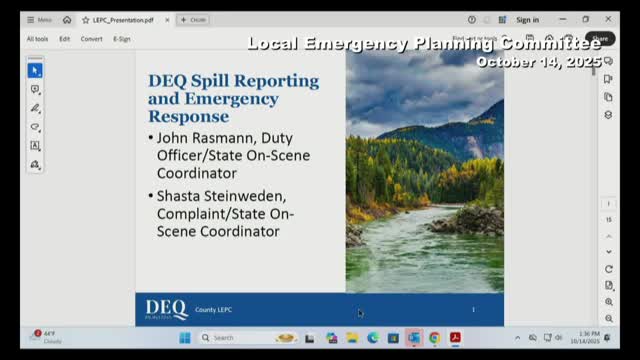DEQ outlines when to report spills, limits of state response and contact info
Get AI-powered insights, summaries, and transcripts
Subscribe
Summary
Montana DEQ told the Missoula LEPC that spills meeting 40 CFR 302 reportable quantities, petroleum tank releases and any release that could lower groundwater quality should be reported. The agency explained its duty officer role, on-scene coordinator criteria, and that there is no statewide fund for orphan spills.
John Rassman, duty officer coordinator and state on-scene coordinator for the Montana Department of Environmental Quality (DEQ), told the Local Emergency Planning Committee on Oct. 14 that certain hazardous releases must be reported and that DEQ’s response is constrained by jurisdiction and funding.
DEQ’s reporting line and thresholds are meant to ensure rapid notification and follow-up. “Spills, releases or discharges of hazardous substances in amounts that meet or exceed the reportable quantities in 40 CFR 302” must be reported, Rassman said. He added that suspected releases or overfills from underground storage tanks and petroleum storage tanks carry a 24-hour reporting requirement to preserve eligibility for the petroleum tank cleanup fund.
Why it matters: prompt reporting allows DEQ to notify responsible parties and oversee cleanup. Rassman said the agency depends on the responsible party to perform cleanup and to submit reports for DEQ review; without a known responsible party, DEQ has limited options and no standing fund for orphaned contamination.
What to report and how
- Reportable substances: releases that meet federal reportable quantities (40 CFR 302). - Petroleum threshold: spills of 25 gallons or more of any petroleum product should be reported; DEQ will accept smaller spills for review. - Groundwater risk: any release that can lower groundwater quality below standards should be reported. - Minimum information DEQ needs: responsible party name/address/phone (or DOT number for trucking incidents), precise location (mile marker or lat/long), incident date and observable impacts to water.
Contact and response roles
Rassman said DEQ maintains a 24/7 duty officer phone line for hazardous-material emergencies (431-0014) and a staffed enforcement/main line for non-emergency complaints ((406) 444-0379) during business hours. DEQ’s duty officer will route incidents and can connect callers to an on-scene coordinator, but DEQ will not self-deploy; the agency requires a request from local authority to have a state on-scene coordinator respond.
DEQ’s on-scene coordinators will bill responsible parties for state costs, Rassman said. The agency has a “pretty good success rate” — he estimated about 90 percent of reported incidents are cleaned up — but some incidents remain orphaned because no responsible party or insurer can be located.
Examples and limitations
Shasta Steinwein, complaint coordinator and state on-scene coordinator at DEQ, described several incidents the agency has handled, including a laboratory chemical hoarding cleanup, a multi-mile crude-oil impact on Little Wall Creek and the 2023 Reed Point train derailment. Steinwein emphasized that DEQ’s jurisdiction and resources determine on-scene involvement: incidents with low water-quality risk (for example, some coal or beer train derailments) may be monitored from the office rather than having a state on-scene coordinator sent.
Questions and clarifications
Committee members asked about orphaned-material funding and technical resources DEQ can provide without EPA participation. Rassman and Steinwein said orphaned incidents remain the responsible party’s obligation; DEQ can issue administrative orders and penalties if parties do not respond. If EPA responds, federal teams bring additional contractors and funding and can streamline permitting; when DEQ responds alone, the state bills the responsible party for costs and provides technical coordination with other state agencies in unified command.
The presenters said they can provide links and training contacts and that DEQ participates in some DES training opportunities. Rassman asked that anyone with locality-specific questions provide contact details so DEQ can follow up.
